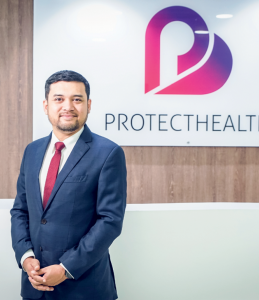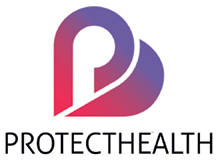Dato’ Dr Anas Alam Faizli, 41, took over as ProtectHealth CEO in October 2020. He knew his job would not be easy given that Malaysia and the world were amid a pandemic with vaccinations in short supply.

But looking at the daily vaccination figures of more than 400,000 today, which half is contributed by the private medical practitioners (PMPs), Dr Anas and his team at ProtectHealth have risen to the task admirably.
There are more than 1,500 vaccination centres (PPVs) currently operating nationwide which involves the PMPs. Anas and his entire team have been busy working around the clock managing the centres, vaccine distribution and getting more PMPs to participate.
“I think so far the Covid-19 Immunisation Task Force (CITF) and Ministry of Health (MoH) are doing well despite the challenges. We mobilised our team to help in this programme. No one is excluded,” said Anas.
Interestingly, Anas, who holds a doctorate in Business Administration, is a construction and an upstream oil and gas professional. He worked in companies like Petronas Carigali Sdn Bhd, Talisman Malaysia and Edgenta PROPEL Berhad. Also involved
in industry association, he was Assistant Honorary Secretary of the Malaysian Oil & Gas Services Council (2016-2018).
He also co-founded BLINDSPOT, a socio-economic think tank, a group of concerned citizens voicing out the voice of the voiceless. He was also formerly a Founding Chief Executive Officer on the Teach for The Needs (TFTN) board, which houses volunteers, university students, and adopts orphanages.
Anas is also the author of the bestselling book titled ‘Rich Malaysia, Poor Malaysians’. In 2013, Astro Awani named him among the Top 10 social media influencers.
In this interview with The Health, he talks about the national vaccination programme and the main challenges.
What are the critical challenges in implementing the NIP?
We have PMPs spread all over the country. To support the vaccination programme, we need to know how many GPs we need in each State.
Next was to build a proprietary system to link all PMPs registrations, management, training, and monitor the vaccine administration. Through the system, we can also get direct updates from MySejahtera on the vaccination rates.
ProtectHealth also needs to provide training to the PMPs which are registered on vaccine and PPV management. We monitor vaccination activities, investigate anomalies, and carry out relevant analysis and reporting.
Another critical challenge is the logistics and the fluidity of the vaccines supply and utilisation.
There are situations where the supply of one type of vaccine is running low, and the other is in abundance. MoH Pharmacy needs to identify and distribute them accordingly to avoid wastage. There are so many fluidities in the planning.
It is noteworthy that there is no playbook on carrying out a nationwide vaccination programme. We can try to learn from the experience of the Spanish flu or SARS virus, but those are on different scales and are of a different timeline.
What is the logistics in terms of distributing the vaccines nationwide, particularly to rural areas?
At the moment, there are three vaccines distributed nationwide – Pfizer, AstraZeneca and Sinovac. For AstraZeneca, the distribution is relatively straightforward as it is only assigned to eight locations. Pfizer, on the other hand, must be stored in an ultra-low temperature freezer. MoH only have about 60 vaccine storage centres.
As for the rural areas and undocumented migrant workers, the idea is to utilise single-dose vaccines like CanSino or Johnson & Johnson.
We will not discriminate concerning nationality. As long as they are in the country, we will vaccinate them because everyone is vulnerable to Covid-19. We can fight the pandemic by getting as many people vaccinated as fast as possible.
Could you please update us on the participation of PMPs in the NIP?
We have about 8,000 GPs nationwide, but only 3,000 have registered so far. We have about 1,000 active GP PPVs.
As of July 26, 2021, there are more than 1,600 active PPVs involving the PMPs and Healthcare NGOs, comprising 1,654 PPVGP; 31 PPVKP; 122 PPVHS; 25 PPVACC; 6 PPVAZ; 68 PPV Integrasi/Mega; 48 PPV Industri; 18 PPV Mobile; and 6 Healthcare NGOs.
There are three models on how the PMPs can participate in the vaccination programme. First, give the vaccine in their own facilities – clinics, private hospitals, ambulatory care centres, or specialist clinics. The second model is giving vaccines outside their facilities by joining the mega PPV facilities. The third one is the PPV Industri for the critical economic sectors.
How will the participation of private healthcare providers help the NIP?
For the past two years, the government has been fighting the pandemic. So, now is the time for the private sector to rally and contribute to the vaccination. This will ease the burden of the Ministry of Health (MoH) and its workforce.
The initial target was that 30 per cent of the vaccination under the NIP will be done by the private sector. This has now been increased to 60 per cent as ProtectHealth’ scope has been added to also implement Healthcare NGOs’ participation in NIP.
With PMPs, we can increase appointments and vaccination rates at the nearest GPs instead of at government hospitals or PPV mega centres located further away.
In a nutshell, the participation of PMPs will
allow us to have additional facilities and manpower to help with the NIP. We urge more PMPs to come forward and register. Also, these PMPs will be an extension of government facilities, so it is still under the NIP.
Do private medical practitioners have the facilities to store the vaccines?
We have a requirement set in place for PMPs interested in participating in the NIP. They must have a cool box, fridge, or freezer to maintain a specific temperature to store the vaccines. Once
the vaccine is out of the box, the GPs must maintain the required temperature in a cold pack, fridge or freezer.
Will private healthcare providers, including general practitioners, be allowed to register for vaccination at their facilities?
In Malaysia, there are only two vaccinators – the MoH and ProtectHealth. So, what ProtectHealth does is appoint PMPs under the NIP for government-supplied vaccines only. We will not be involved when PMPs start giving vaccines sourced directly from manufacturers. — The Health








